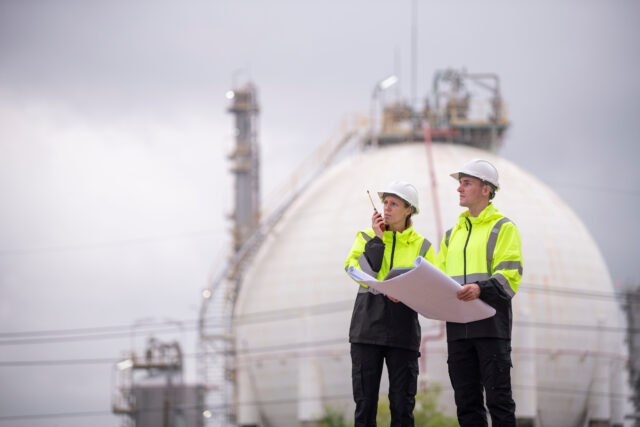Finding the right energy compliance services for your business
Whether you're dealing with audit challenges, preparing for ISO 50001 or trying to stay ahead of regulatory change, a trusted compliance service can help you turn obligations into opportunities — and keep you moving forward with confidence.

Finding the right energy compliance services for your business
Keeping up with energy regulations can feel like chasing a moving target. This is especially so for businesses juggling daily operations, internal reporting, and evolving sustainability goals.
With new schemes, shifting compliance deadlines and increasing scrutiny, internal teams are often stretched thin. That’s where third-party energy compliance services come in. These services provide the expertise, tools and ongoing support needed to stay compliant, audit-ready and strategically aligned.
What are energy compliance services?
Energy compliance services help businesses meet regulatory, reporting and sustainability requirements tied to energy use and carbon output. These services are designed to reduce internal workload, support technical obligations and improve readiness for audits or certifications. Whether you’re preparing for ESOS or ISO 50001, or simply need clarity on what’s expected, these services provide tailored guidance and hands-on support.
Common services include:
- Compliance audits and gap assessments — Initial reviews to identify risks, inefficiencies or non-compliance
- Regulatory reporting support (ESOS, SECR, etc.) — Help compiling data, calculating metrics and submitting formal reports
- ISO 50001 consultancy and system design — Guidance in building and embedding energy management systems
- Emissions tracking and energy monitoring — Setup of tools and dashboards to monitor usage and environmental impact
- Advisory services for upcoming regulation — Insights into future policy shifts and how to prepare for them
These services form the foundation of a strong energy compliance strategy. By covering both technical and advisory needs, they enable businesses to stay ahead of regulations, reduce risk and operate more efficiently, without overwhelming internal teams.
When should you consider external support?
Not every organisation has an in-house energy expert, but all are accountable for compliance. Knowing when to seek external support can prevent unnecessary risk and reduce pressure on your internal teams. Here are some five common scenarios where bringing in an energy compliance service makes sense.
1) Internal expertise is limited
If your business lacks the capacity or skill set to interpret technical requirements or track shifting regulations, outsourcing helps bridge that gap. A specialist can step in quickly and reduce the risk of oversight.
2) Audit issues or compliance failures occur
If audits regularly uncover issues or deadlines are missed, it’s a signal that current processes may not be working. External providers can quickly identify the root cause and help implement fixes before the next audit cycle.
3) Resources are stretched
Small or busy teams often struggle to manage compliance on top of daily operations. Outsourcing allows you to stay on track without increasing headcount or overloading staff.
4) New markets or regulatory zones are entered
Expanding into a new location often introduces new energy regulations. A service provider can help you understand the obligations from day one and ensure you’re compliant as you scale.
5) You’re preparing for ISO certification or ESG reporting
Whether you’re targeting ISO 50001 or compiling ESG disclosures, energy compliance services can streamline the preparation process and provide trusted validation of your data and systems.
What to look for in a good provider
Choosing a provider isn’t just about credentials — it’s about fit, capability and trust. A good energy compliance service should understand your business needs and offer practical, tailored support. They should complement your team, not just provide checklists.
Look for:
- Proven industry experience and regulatory knowledge
- Ability to tailor services to your sector or business scale
- High-quality tools and clear reporting outputs
- Support that spans audits, documentation and advisory
- A strong track record with case studies or references
Finding a provider that brings the right mix of expertise, tools and adaptability can make a measurable difference to how smoothly your compliance efforts run. The right partner should feel like an extension of your team — bringing clarity, confidence and consistency to every stage of the process.
Questions to ask before choosing a partner
Before you commit to an energy compliance service, it’s worth asking the right questions to assess their capabilities and alignment with your needs. The answers will help you understand how they operate and what kind of working relationship you can expect.
Can they support multiple regulatory schemes? – Ask if they cover ESOS, SECR, ISO 50001 and any sector-specific or regional schemes you fall under.
Do they offer software or dashboards? – Many providers include platforms for data tracking and reporting. Find out if these integrate with your current tools.
How do they stay current with regulatory changes – You want a provider who proactively monitors changes and keeps you informed — not just one that reacts when deadlines loom.
What training or onboarding is included? – Clarify how they’ll bring your internal team up to speed and what support is included post-implementation.
What happens after you engage a service provider?
Engaging an energy compliance service isn’t a one-off transaction — it’s a phased relationship that evolves as your compliance needs shift. Once the contract is signed, here’s how things typically unfold.
Kick-off or gap analysis
Your provider will begin with a comprehensive review of your current systems, data and documentation. This might involve site visits, interviews with key personnel and a review of past audit records. The aim is to pinpoint risks, uncover opportunities and establish a baseline for compliance.
Custom compliance roadmap
Based on the initial findings, the provider will develop a tailored roadmap to address gaps and maintain compliance moving forward. This may include upgrades to monitoring systems, updated processes, new reporting cycles or staff training. The roadmap ensures everyone knows what’s required, by when and by whom.
Ongoing monitoring and reporting
With systems in place, the focus shifts to maintenance and performance tracking. Your provider may offer monthly reports, real-time dashboards or regular status updates — helping you stay audit-ready and aligned with evolving targets.
Quarterly reviews or audit preparation
Many partnerships include structured reviews throughout the year. These meetings help address minor issues before they escalate, adapt plans as needed and prepare thoroughly for upcoming audits. Your provider becomes a proactive partner — not just someone who responds to deadlines.
How we can support your compliance goals
When regulatory complexity escalates, having a partner who makes compliance both simple and actionable is invaluable. We help organisations stay ahead of changes — whether that’s ESOS, SECR or sector-specific mandates — by cutting through industry jargon and providing clear, tailored support
Their approach centres on hands-on guidance, not just advice. This means working alongside energy and sustainability teams to manage data collection, execute audits, and handle submissions in whatever form suits your internal capacity.
More than just avoiding penalties, this support builds stakeholder confidence. By showing regulators, boards and customers that compliance can be turned into operational value, we transform a risk into a strategic asset
Conclusion
Choosing the right energy compliance service is more than a tick-box exercise — it’s an investment in your organisation’s resilience and credibility. The right partner helps you manage complex regulations, reduce risk, and focus your internal resources where they’re most valuable.
Whether you’re dealing with audit challenges, preparing for ISO 50001 or trying to stay ahead of regulatory change, a trusted compliance service can help you turn obligations into opportunities — and keep you moving forward with confidence.
Related Articles
-

Net Zero Pathway
How to manage energy compliance regulations
As sustainability takes centre stage in business strategy, energy regulations are starting to change, quickly. Many organisations now face a growing list of energy compliance…
Find out more -

Business update
How to conduct an environmental compliance audit
Staying on the right side of environmental regulation is essential for businesses. An environmental compliance audit is a structured way to verify that your operations…
Find out more -

Business update
Carbon emission monitoring systems: How do they work?
For companies striving to meet regulatory requirements, sustainability goals, and Net Zero targets, a robust carbon emission monitoring system is no longer optional,it’s essential.
Find out more